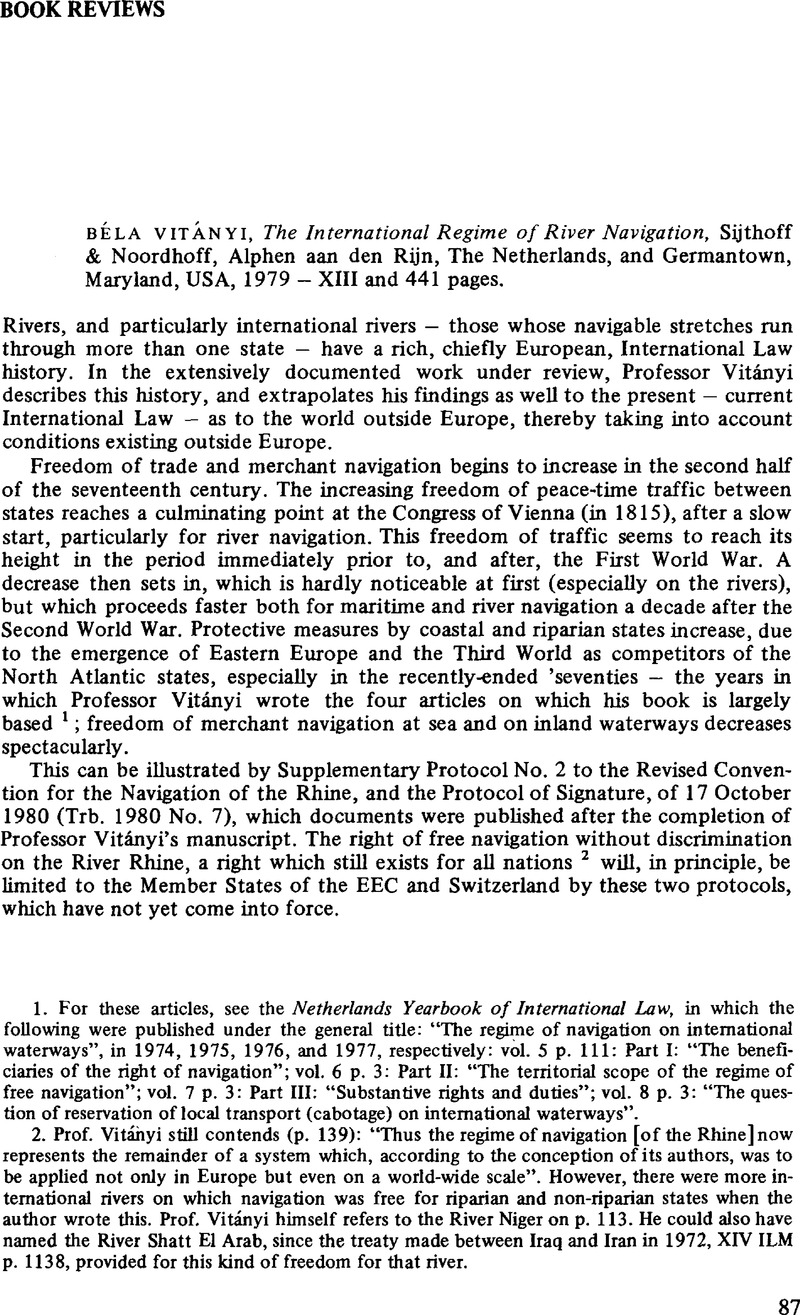No CrossRef data available.
Published online by Cambridge University Press: 21 May 2009

1. For these articles, see the Netherlands Yearbook of International Law, in which the following were published under the general title: “The regime of navigation on international waterways”, in 1974, 1975, 1976, and 1977, respectively: vol. 5 p. 111: Part I: “The beneficiaries of the right of navigation”; vol. 6 p. 3: Part II: “The territorial scope of the regime of free navigation”; vol. 7 p. 3: Part III: “Substantive rights and duties”; vol. 8 p. 3: “The question of reservation of local transport (cabotage) on international waterways”.
2. Prof. Vitányi still contends (p. 139): “Thus the regime of navigation [of the Rhine] now represents the remainder of a system which, according to the conception of its authors, was to be applied not only in Europe but even on a world-wide scale”. However, there were more international rivers on which navigation was free for riparian and non-riparian states when the author wrote this. Prof. Vitányi himself refers to the River Niger on p. 113. He could also have named the River Shatt El Arab, since the treaty made between Iraq and Iran in 1972, XIV ILM p. 1138, provided for this kind of freedom for that river.
3. Emphasis added.
4, Colombos, C.J., The International Law of the Sea, 6th Ed., (Longmans, Green & Co., London, 1967) p. 150Google Scholar.
5. See e.g., McDougal, M.S. and Burke, W.T., The Public Order of the Oceans (New Haven and London, 1962) p. 105, n. 43Google Scholar. These authors state on the same page: “State practice in recent centuries affords no indication that states may demand access to the ports of other states as a matter of right.”.
6. See Barabolya, P.D., Manual of International Maritime Law, Department of the Navy (Washington, D.C., 1968) pp. 192–196Google Scholar. This manual is a translation from the Russian; the original text was published in Moscow, in 1966.
7. See Greenfield, J., China and the Law of the Sea, Air and Environment (Sijthoff & Noordhoff, Alphen a/d Rijn, the Netherlands, and Germantown, Maryland, USA, 1979) on p. 29Google Scholar: “Clearly there is no idea of a right of access to ports;…”; see also p. 30, where Colombos's view is explicitly rejected as far as China is concerned.
8. Author's emphasis.
9. Prof. Vitányi has himself apparently been in doubt about the correct answer as well. At least, this seems to follow from the conclusion he drew in respect of the self-same question in 1974. This conclusion, in respect of recognizing “freedom of navigation” under customary law, was then restricted to Europe. He stated: “Freedom of navigation on Europe's international waterways applies, in the absence of express agreement to the contrary, to all nations.” – o.c. V NYIL, 1974 p. 166; emphasis added – a statement which he did not repeat in 1979.